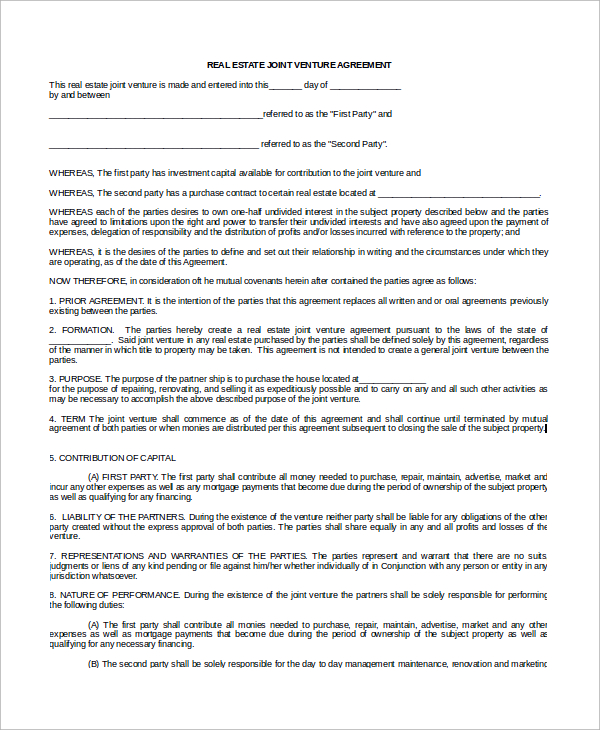

This can be a mutually beneficial arrangement when one partner has a specific skill set but doesn’t have any capital. For example, one partner may supply the capital and play a more silent role, while the other partner puts in all of the sweat equity. Passive real estate partnership agreements differ from active ones because one or more partners may not put in any active work.

Although their roles and activities may differ, they generally put in an equal amount of direct work and sweat equity. There are two main types of real estate partnership agreements: active or passive.Īctive real estate partnership agreements are those in which each partner puts in active work into a project on a regular basis. You can customize roles and responsibilities based on each partner’s competencies, availability, or even based on the needs of the investment deal itself. One of the great things about striking a partnership agreement in real estate is that you can customize it in many ways. Passive Real Estate Partnership Agreements Some investors even recommend working on a deal together before entering a contract agreement that way, you can get a better understanding of one another’s working styles. It is important not to rush into an agreement, even if things seem to line up first. These criteria are not going to appear overnight - finding a business partner can take time. When entering into a business with someone, it is crucial to find someone who balances your skillset, believes in the same mission, sets similar financial goals, and is trustworthy. A successful business partnership goes beyond a history of friendship or the ability to get along. The trickiest part of a real estate partnership agreement is finding the right investor to work with. Furthermore, investors also get to balance one another’s strengths and weaknesses - which can be extremely helpful during the sometimes hectic process of starting a real estate business. These include the potential to divide responsibilities, take on more properties, and essentially double their networks. Together, this partnership structure allows both investors to reap the benefits of real estate despite not starting with resources (money and time).Įven for investors with real estate financing all figured out, there are still numerous reasons to enter a partnership agreement. In many cases, investors who manage a business will team up with a business partner who can provide the capital needed to get started. The most common reason investors look for partnerships is related to funding.

However, several benefits make real estate partnerships worth considering. There is no requirement to enter the real estate industry with a business partner, and many investors go their entire careers without one. So before you start working on yours, let’s take a look at some of the most important elements of a real estate partnership agreement: That being said, not all partnership agreements are created equally. Unfortunately, many investors do not understand how important these protocols are until it is too late.
Joint venture agreement real estate how to#
Further, a partnership agreement will tell both parties how to act if anything ever happens. The right partnership will premeditate any number of issues that could occur with a real estate business. Partnerships are critical when income-generating assets are involved, such as real estate. Sometimes, adverse circumstances occur, and it is crucial to have a framework in place before this ever happens. While every investor enters a business partnership hoping for the best, it is still important to prepare for the worst. A partnership agreement can actually provide legal protections to both partners (and the business) if operations do not go according to plan. Although, the real estate investors need a partnership agreement is not simply for formality. It will typically outline shared goals and a mission for the business the purpose is to ensure both partners are consistently working towards the same thing. Why You Need A Real Estate Partnership AgreementĪt its core, a real estate partnership agreement shows a commitment between two business partners.


 0 kommentar(er)
0 kommentar(er)
